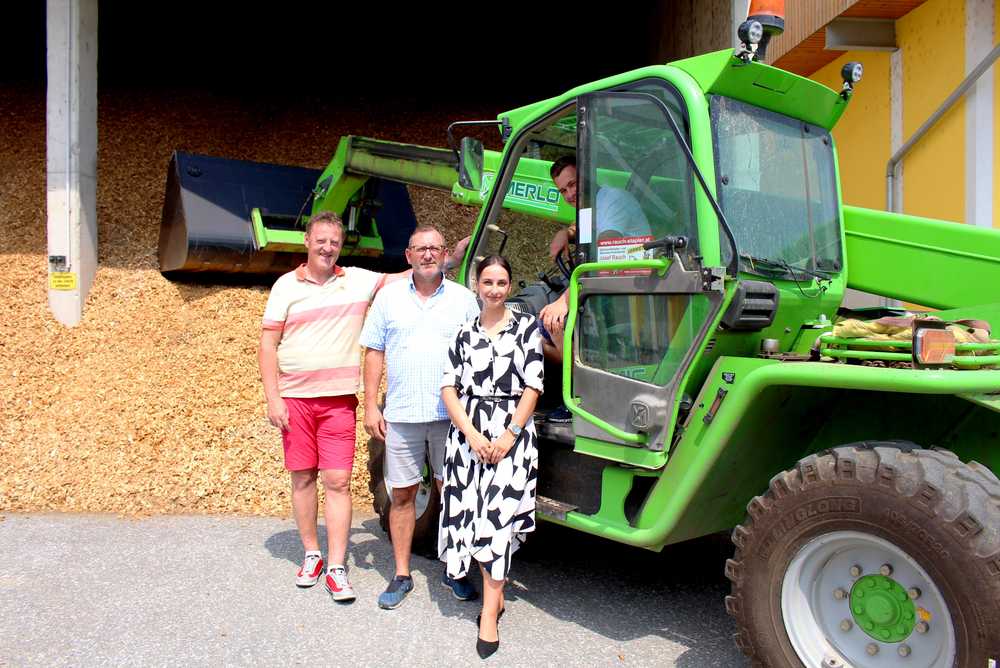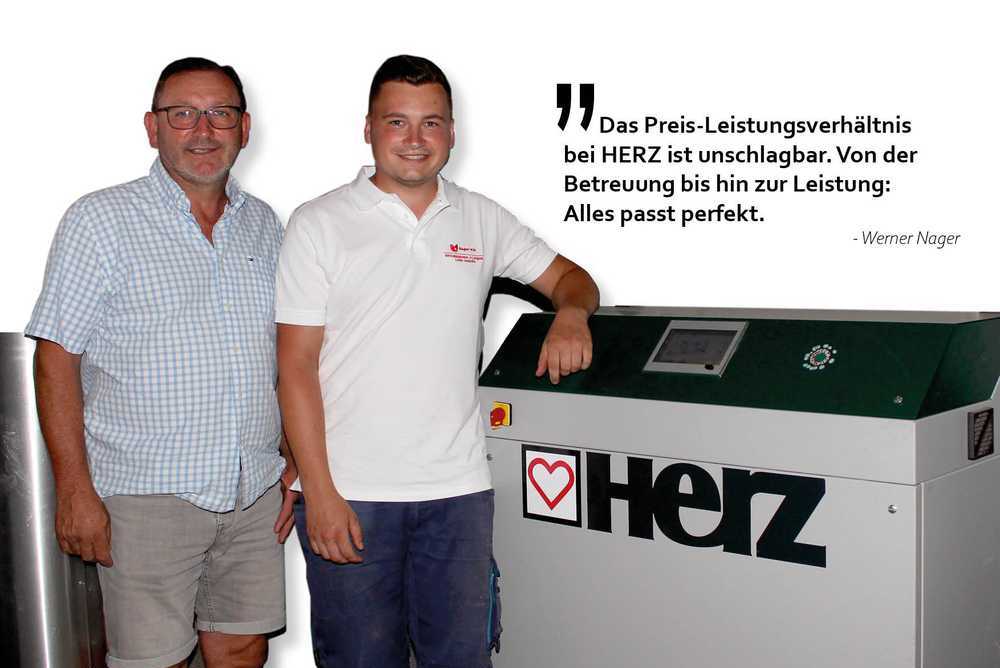Local heating wundschuh
Unreliable gas supply as an opportunity for the environment
For decades, Werner Nager, managing director of the Wundschuh heating supply company, has been committed to local heating in Wundschuh – a decision that initially seemed like a fight against windmills against strong competition from gas. But with the increasing insecurity of gas supply due to the war in Ukraine, the tide has turned: demand for local heating has been rising rapidly ever since. More and more people are looking for safe and cost-efficient alternatives, supported by attractive subsidies. Werner Nager is experiencing a boom that shows how much the need for security and sustainable energy solutions has grown.


A leap in the dark
When the housing association asked Werner Nager to build a heating plant on his property, his journey from being a farmer to being involved in energy supply began. At that time, a few public institutions and single-family homes were connected. Today, the registered cooperative, Wärmelieferung Wundschuh, with 21n members, supplies all public institutions in the entire town centre of Wundschuh, a municipality in the district of Graz-Umgebung, in addition to numerous single-family homes. In the beginning, he had to deal with a lot of scepticism, but today he knows for sure: every conversation.
The perfect duo for the switch: insecure gas supply & promotion
The insecurity of gas supply, combined with attractive subsidies, has led to strong demand for local heating. According to Werner Nager, the subsidies make the switch much easier, as they reduce investment costs and obviously make local heating a cost-effective alternative. Households are increasingly opting for local heating in order to maintain security as well as save costs. In an interview with HERZ News, Werner Nager and Günter Karner, Chairman of the Board of Wärmelieferung Wundschuh, discuss the extent to which the funding measures have been successful.
HERZ News: What role do subsidies play in Austria in the successful switch to an efficient heating supply?
Werner Nager: The high level of federal funding has definitely contributed to the fact that many households have switched to our local heating. Last year, our customers received 70% funding, plus the state funding, which of course makes switching very attractive. We even had one customer with a 100% funding subsidy. However, I have received a particularly high level of demand during the coronavirus crisis and the uncertainties regarding gas supply as a result of the war in Ukraine.
HERZ News: So the bottleneck and the lack of security have also contributed a great deal to this. The rising gas prices probably too?
Werner Nager: Many gas customers were disappointed because gas prices rose rapidly and to an unmanageable extent. Gas was our biggest competitor because it was so cheap and took many customers away from us that we had only acquired after 20 years. In the meantime, the security of supply has become an issue. Gas is not always available in the quantities we need – but wood is, it just needs to be transported home (laughs).
HERZ News: But surely you also have index adjustments?
Werner Nager: Of course, we also have to think economically. Until recent years, we had hardly any price adjustments. We have a village character here and know every customer personally. If we increased prices by 100 per cent, like district heating, I would no longer be able to go to a restaurant (laughs).
HERZ News: What are the advantages of local heating? Why should you connect?
Werner Nager: We have a secure supply. Local heating customers no longer have to worry about whether there will be enough gas or not. We need wood and that grows back. In the event of a power outage or an emergency, we can continue to ensure the supply with our emergency power generator. What's more, we also heat in an almost CO2- Environmental considerations alone are sometimes not enough to justify replacing an existing system. In such cases, the financial incentive offered by the rather generous funding guidelines plays a major role.
HERZ News: What is the procedure for connecting to the district heating network? What criteria must be met to be connected to the district heating network?
Werner Nager: There is an initial meeting, during which the house is inspected and the heating requirement is calculated. This is essential for the cost estimate because the connection costs are calculated according to kW. We also let the end user know how much of their costs will be subsidised and how much they will have to cover themselves. Our chairman is responsible for this together with the planning office. However, it also has to be economically viable, I can't lay metres of pipe to connect a single detached house. In addition, we have to prove that a certain amount of CO2 will be saved as a result of the connection in order to receive the funding at all.
HERZ News: To what extent are you dependent on funding?
Günter Karner: We are dependent on Kommunalkredit Public Consulting (KPC). If the supply network is too large but the demand too small, we don't receive any funding. We then took the initiative ourselves for the most part and looked at the properties up to the desired customer, asked whether they also wanted to connect, so that we could realise the project. We were then very successful and were thus able to start the major network expansion.
HERZ News: How long did the network expansion take?
Günter Karner: We had already installed the entire boiler house and increased our buffer in 2018. Due to the gas bottleneck and the subsidy, another major expansion has been added. The decision for the major expansion was made in 2022 and we completed it in 2024. Without the subsidy, we would have definitely lost 50% of our customers and we would not have been able to realise the project on this scale.
HERZ News: And what about the costs of this?
Werner Nager: Meanwhile, we are at around €3 million. The challenge with funding is that I only receive the funding after the project has been completed. No payments are made in the meantime. The huge increase in interest rates on loans is, of course, a major hurdle for investments when the project takes years to complete and I have to finance everything up front.
HERZ News: How large is your facility?
Werner Nager: Two compact BioFire wood chip boilers from HERZ are currently in operation, each with a nominal output of 400 kW. During the first network expansion in 2018, we added a HERZ BioFire wood chip boiler to our existing system at the time and were more than satisfied with it. Therefore, this year, when the network was expanded, we decided to replace the old system with a second HERZ BioFire wood chip boiler and to remove the old system completely.
HERZ News: Why not one large industrial plant instead of two boilers?
Werner Nager: We were very limited in terms of space; a large industrial boiler would not have been possible from a construction point of view. The HERZ BioFire wood chip boilers are very compact and provide the power we need. Since we have the same design for both boilers, we can store spare parts, which is also very practical for us.
HERZ News: What were your criteria for selecting a system and why HERZ?
Werner Nager: As with our customers, the safety factor was also a big point for us. HERZ is a large company and offers not only boilers but also many other products. The company will continue to exist for a long time and will not have to throw in the towel like many other companies in the industry. What use is it to me if I buy a cheaper product today and after a few years the company no longer exists? In addition, HERZ offers unbeatable value for money. Both boilers run smoothly, the customer service is good, everything is just right, from the support to the performance. We didn't even consider looking at other suppliers.
HERZ News: We are very pleased to hear that. Thank you for the authentic insights. The positive experiences and impressions of our customers encourage us in our endeavours. We hope you continue to enjoy using our products.
HERZ BioFire wood pellet boiler
The HERZ BioFire wood chip boiler is the ideal solution for large projects such as local heating networks, hotel complexes, housing developments and much more. It is available with nominal heating outputs from 400 kW to 1,500 kW. For higher heat demand, there is the option of a cascade operation, in which several boilers are connected together to increase output. Further advantages and detailed information on the HERZ BioFire wood chip boiler can be obtained by scanning the QR code.
Switch to biomass or heat pumps now and receive up to 75% funding. Arrange your free consultation with a HERZ employee now. You can find detailed information on the funding at https://www.herz-energie.at/kesseltausch/
httpswww.herz-energie.atenproductswood-chip-pellet-boilerherz-biofire-500-1500noredirect=en_US

